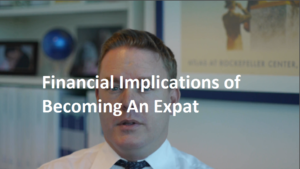Financial Considerations of Becoming An Australian Expat
27/07/2016 – As the Australian workforce becomes more globally mobile we are constantly meeting people overseas who either didn’t do their homework or were told incorrect or out of date information when they made the move. In this weeks video we run through some of the considerations that Australians have to make when they are planning to start a new life overseas.
Click on the image below to view the video.
If you have any questions that you would like to see included in these videos leave your comments below or tweet us using the #askatlaswealth hashtag.
A transcript of the video is copied below.
G’day expats or soon to be expats given today’s topic. Today we wanted to run through a couple of issues that we find that people are experiencing when they’re about to become an expat.
Quite often when you’re about to move overseas there’s lots of exciting things to take into account. Where the kids are going to go to school, where you are going to live, restaurants, the whole lifestyle gamut of becoming an expat. But quite often we find that people don’t take the time or the attention to look into their finances before they move overseas. In today’s topic we want to talk about some of the key points you need to consider and how we can help in dealing with those issues.
The first port of call is always to review your finances. Most people have superannuation so that’s always the best place to start. When reviewing your super there’s a lot of key issues that you need to take into account. First of all, does your super fund allow you to be a member whilst you are overseas? Now this may seem like a silly question but time and time again we’re coming across super funds that once they find out one of their members is a non-resident they are actually asked to leave the super fund. So first thing you need to do is find out whether that is okay. The best way to do this is actually to send an email to the super fund. The reason we recommend an email is so you have a paper trail should any problems arise down the track.
The next thing you need to consider is any insurance inside of your super fund. Now this is important because a lot of super funds once you move overseas and become a non-resident, you can’t actually access the benefits of life and TPD and any other insurances associate with that super fund. Once again we always recommend clients to email their super fund and get it in writing whether their insurance is valid or is invalid as an expatriate. The reason we recommend doing this as well is you maybe living overseas for the next five years and you actually maybe paying for insurance policy that you can’t actually claim on so it is always best to clarify this.
The next issue you have to look at is any investments that you may have whether they be direct shares or managed funds. Now when you consider these investments the most important part to take into account is when you acquired these investments and how you want them treated by the ATO when you leave. There are two ways you can handle these investments. One is called deemed disposal and the second one is carried over. With deemed disposal what happens is the ATO looks at your share or managed fund portfolio and assumes that you have liquidated those holdings on the day of your departure. This may seem drastic but what it means is on the day that you’ve left the country you are not accruing any capital gains tax that is liable and owed to the ATO. There are always important considerations to take into account. Obviously the biggest issue is you may have accrued large capital gains up until that point and the tax bill alone may make it not feasible to deem dispose and you may want to carry over those capital gains. If you do elect do that then obviously anytime you’re overseas and you’re still holding these investments, you are still accruing a capital gains liability with the ATO.
The third issue we’d like to talk about is with respect to property. Now a lot of Australians with their love of property have maybe one or two or more properties before they go overseas. Back on the 8th of May 2012 the ATO changed the tax legislation with respect to how capital gains are treated with Australian non-residents. Up until the 8th of May 2012 Australian non-residents, like Australian residents, were able to elect to receive the 50% capital gains discount when they have held a property for greater than 12 months. Since the 8th of May 2012 you are no longer able to access this and this may change your view on do you hold property or do you not hold property whilst you’re a non-resident. Throughout your period of non-residency, you’re actually susceptible to 100% capital gains tax at the non-resident marginal tax rate so you need to review your property holdings and determine whether this is beneficial to you or not. As an Australian non-resident you cannot participate in negative gearing so if you are accruing these losses over time you need to work out whether that’s in your best interest as well too.

